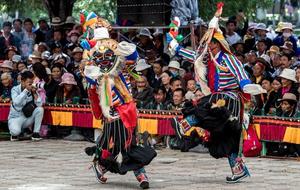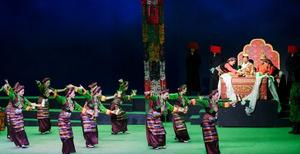 This undated photo shows locals and tourists watching a Tibetan Opera show in Lhasa's Norbu Lingka Park.(XIE SONGXIN / CHINA DAILY)
This undated photo shows locals and tourists watching a Tibetan Opera show in Lhasa's Norbu Lingka Park.(XIE SONGXIN / CHINA DAILY)
LHASA - Standing in the middle of the stage, Dampa Phuntsok, 13, sang a melody from a centuries-old Tibetan opera. His young but vibrant voice enlivened the Dzongyab Lukhang Park at the foot of the majestic Potala Palace in Lhasa.
Tibetan opera troupes across southwest China's Tibet autonomous region often gather at the park during important festival occasions, such as the Tibetan New Year and Shoton (yogurt banquet) Festival, enjoying the celebrations and engaging in friendly competitions.
They are all experts in the 600-year-old art of Tibetan opera, an interesting assortment of talking, singing, acting, dancing and literature
They are all experts in the 600-year-old art of Tibetan opera, an interesting assortment of talking, singing, acting, dancing and literature. Regarded as a "living fossil" of Tibetan culture, the art form was included on the UNESCO Representative List of the Intangible Cultural Heritage of Humanity in 2009.
Bashful but smiling, Dampa Phuntsok said that the troupe he joined was first established more than a century ago. He still remembers the first Tibetan opera he saw at the age of 8.
ALSO READ: Tibetan Opera sings through the ages
Accompanied by his father, the little boy gazed in rapture at the actors and actresses in their colorful costumes, dressed up as deer, cattle and dogs, as well as classic human characters.
"How I longed at that time to be dressed up just like them, dancing on the stage," the child recalled.
From that time, the boy felt a strong bond with Tibetan opera, and would often go to watch the local troupe during rehearsals. Returning to his home in the Tohlung Dechen District of Lhasa, the regional capital, he would dress up in his grandparents' clothes and practice the moves he had learned.
The troupe's senior performer, Tsering Tashi, noticed this smart and curious boy, inviting him to join in rehearsals. Since then, the child became part of the troupe.
 This undated photo shows performers from the Tibetan Opera Troupe staging Bamdien Wangjo's creation, The Love of the Six-string Guitar, during the China Theater Festival in Fuzhou, Fujian province.(PHOTO / XINHUA)
This undated photo shows performers from the Tibetan Opera Troupe staging Bamdien Wangjo's creation, The Love of the Six-string Guitar, during the China Theater Festival in Fuzhou, Fujian province.(PHOTO / XINHUA)
"Mom and Dad both said that I made the right choice," said Dampa Phuntsok.
So far, the 13-year-old has played more than 10 roles in Tibetan operas.
Dampa Dargye, the troupe's manager, said they have 29 cast members at present, the oldest of whom is 63 years old.
"We are glad that the younger generation is willing to learn the Tibetan opera," the manager said, adding that Dampa Phuntsok has brought "new blood" into their "old veins."
READ MORE: Treasure trove from Tibet
Dampa Phuntsok's new dream is to set up a Tibetan opera troupe of his own in the future, which is exactly what another child actor called Tenzin Norbu has been striving to realize.
About four years ago, Tenzin Norbu, 15, established a troupe full of youngsters just like himself. He gave it a Tibetan name that translates as "Dream Youth Tibetan Opera Troupe".
"Nowadays, my classmates are into pop culture, but I want to build an exchange and learning platform for Tibetan opera lovers of my age," he explained.
At present, Tenzin Norbu's troupe has 24 members, with young performers ranging from a 12-year-old to college students.
ALSO READ: Traditional Tibetan bathing listed as UNESCO heritage
"A diligent child who loves the Tibetan opera is hard to find, even if you offer a thousand gold pieces as reward," quipped Tenzin Yeshe, Tenzin Norbu's teacher.
However, he hopes the youngsters will get the recognition they deserve one day, giving full play to their artistic talents.


